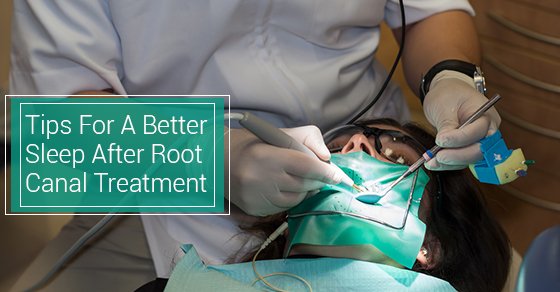Following root canal treatment it is quite common to experience post-root canal pain, including some swelling (inflammation) and tenderness at the site. These side effects typically subside within a few days provided you follow proper post-therapy care, including refraining from chewing or grinding teeth on the side of the mouth where the root canal was done.

Unfortunately, the pain and discomfort can keep you from enjoying your sleep. Your dentist should give you some medication to manage the pain and swelling for any course of root canal therapy, as well as strict guidelines for post-treatment care. With regard to sleeping, it is recommended that you keep your head in an elevated position for the first few nights, unless you have some physical handicap.
If you find it hard to sleep, you can adjust your environment accordingly by:
- Making the room completely dark and cool.
- Listening to relaxing music or sounds so your thoughts can drift without trying too hard to sleep.
- Breathing in and out gently to loosen stiff body parts.
Avoid focusing on the pain or discomfort, as this may cause stress, which may make it harder to sleep. Remember: it is normal to have some root canal related pain after treatment. If anxiety stems from misconceptions, explore the common myths surrounding root canal treatment. Also, don’t use sleeping pills. Here are some other tips to help you sleep better after root canal therapy:
- When you first get home after the procedure, put an ice pack over the treatment site for about 30 minutes to reduce swelling after the root canal. You may apply an ice pack or frozen vegetables (such as peas) for about 10 to 15 minutes each hour.
- You should take some pain-relief medication within an hour of leaving the dentist’s office so it gets into your blood system before the anaesthesia administered during the treatment wears off. Usually, a maximum dose of four tablets equalling 800 mg of ibuprofen (Advil, Nuprin, Motrin) is recommended. You can take two to four tablets four times a day for three to four days after the procedure to help manage sensitivity in the area, so you can enjoy more peaceful nights.
- You can take acetaminophen (Excedrin, Tylenol) instead of ibuprofen in the case of a gastrointestinal disorder or medical condition that precludes NSAIDs. However, acetaminophen does not have anti-inflammatory properties.
- Avoid aspirin and aspirin-containing drugs, since they tend to increase bleeding from the treated area.
- Take the prescribed medication, including pain medication and antibiotics to prevent an infection, as directed.
Lastly, you should contact your dentist if you experience any kind of problem, including extended pain that disturbs your sleep. In some cases, you may have post-root canal issues that need subsequent treatment, such as gum tissue trauma or a high temporary filling that affects how you close your mouth. The sooner you can get these issues addressed, the sooner you can enjoy your sleep.